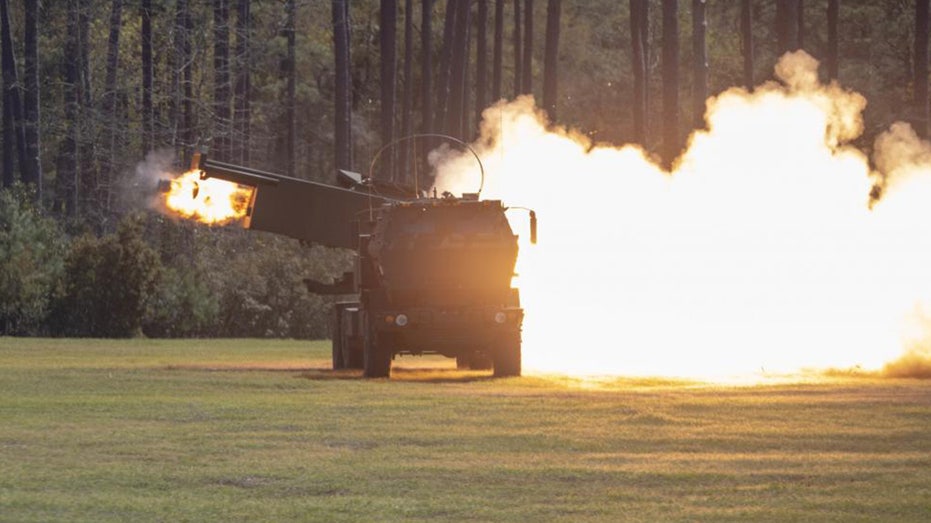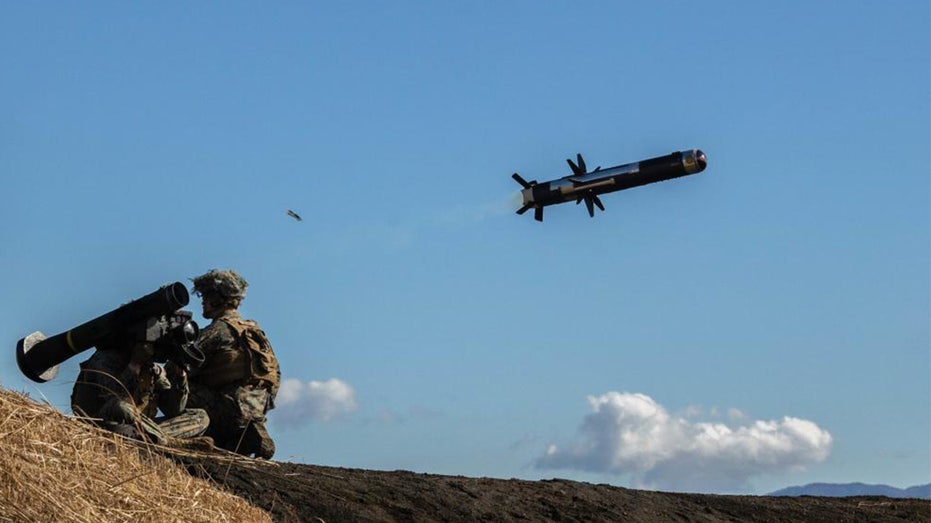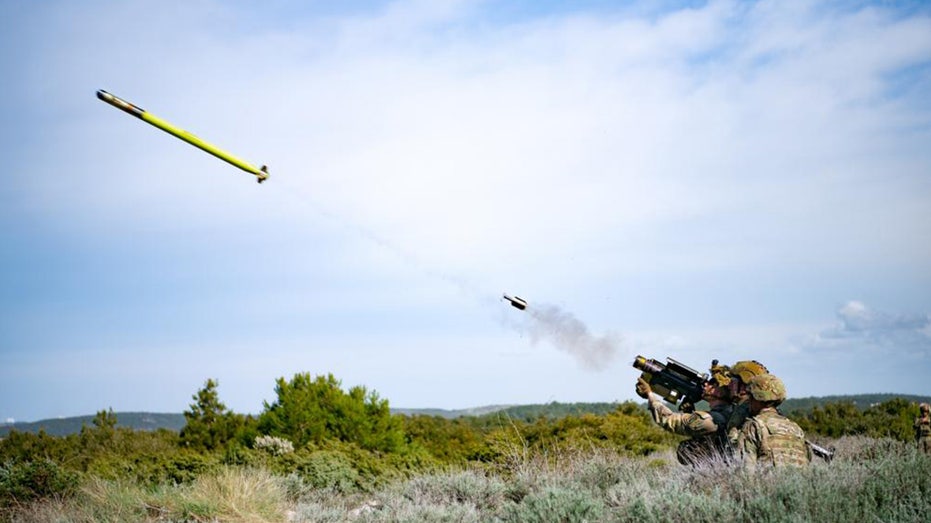US could quickly run out of munitions in conflict with China, defense industry unprepared: report
Several vital weapons systems have low inventories according to the CSIS report
Chances of China-Taiwan conflict ‘very high’ if Biden continues to project ‘weakness’: Rep. Michael McCaul
Rep. Michael McCaul, R-Texas, discusses the future of the U.S.’s relationship with China along with the economic implications of the debt ceiling conflict on ‘Fox News Sunday.’
A new report is sounding the alarm about the status of the U.S. military's stockpiles of key munitions and the capacity of the industrial base to ramp up production, warning that American forces could burn through existing precision weapon stockpiles in less than a week in a potential war with China over Taiwan.
The Center for Strategic and International Studies (CSIS) released a 44-page report last week that warned, "According to a series of CSIS war games, the United States would likely run out of some munitions – such as long-range, precision-guided munitions – in less than one week in a Taiwan Strait conflict." It added that the war in Ukraine has "exposed serious deficiencies in the U.S. industrial base and serves as a stark reminder that a protracted conflict is likely to be an industrial war that requires a defense industry able to manufacture enough munitions, weapons systems, and matériel to replace depleted stockpiles."
The Wall Street Journal interviewed Seth Jones, who authored the report and is a senior vice president at CSIS, who told the outlet, "The bottom line is the defense industrial base, in my judgment, is not prepared for the security environment that now exists." Jones told the Journal the defense industry's current operational pace is "better suited to a peacetime environment" and said, "How do you effectively deter if you don't have sufficient stockpiles of the kinds of munitions you're going to need for a China-Taiwan Strait kind of scenario?"
US ARMS SALES JUMP BY 50% IN 2022 AMID SECURITY CONCERNS OVER WAR IN UKRAINE, CHINA AGGRESSION

Marines with the 10th Marine Regiment, 2nd Marine Division fire a practice rocket from a M142 High Mobility Artillery Rocket System (HIMARS) during an Exercise Rolling Thunder 22-2 at Camp Lejeune, North Carolina, on April 4, 2022. (U.S. Marine Corps photo by Lance Cpl. Megan Ozaki / 2nd Marine Division / Fox News)
In an appearance on "FOX News Sunday" a pair of bipartisan pair of lawmakers on key House committees discussed the CSIS report with host Shannon Bream and expressed concerns about the state of the Pentagon's munitions stockpiles and the defense industrial base's capacity to rapidly replenish them.
House Foreign Affairs Committee Chairman Michael McCaul (R-Texas) told Bream that he's "very" worried about the situation and added, "Our defense industrial base is broken. I signed off on all foreign military weapon sales three years ago. They have yet to go into Taiwan, so we need that deterrence. But if we don't have the weapons, that's as critical for deterrence."
McCaul noted that Congress approved additional funding to replenish U.S. stockpiles of several in-demand weapons systems in a supplemental spending package included in the omnibus appropriations bill last month, in addition to helping NATO militaries modernize and providing more aid directly to Ukraine.
OMNIBUS CONTAINS $11.9B FOR PENTAGON TO REPLENISH WEAPON SYSTEMS SENT TO UKRAINE

Marines with the 1st Battalion, 2nd Marines fire a Javelin shoulder-fired anti-tank missile during Exercise Fuji Viper in Japan on December 15, 2022. (U.S. Marine Corps photo by Lance Cpl. Jaylen Davis / 3rd Marine Division / Fox News)
House Armed Services Committee Ranking Member Adam Smith (D-Wash.) concurred and told Bream the situation is a "huge problem" and that "we don't have the industrial base, and we don't have the ability to ramp up that industrial base." Smith explained that the defense industry doesn't want to make major investments in expanding production capacity for key weapons systems without a "demand signal, without knowing that we're going to buy them." but added, "U.S. taxpayers don't want to spend a ton of money on weapons that we don't need."
"We need to increase that ability to surge when we need it, which means we desperately need to increase our manufacturing base for key weapons systems." Smith also emphasized, "War is not inevitable. That's a very dangerous situation we need to be prepared for, but I'm fully confident that we can avoid that conflict if we take the right approach."
FLOW OF MILITARY AID TO UKRAINE CAUSES $4B BACKLOG IN TAIWAN AID: REPORT

Army paratroopers with the 173rd Airborne Brigade fire a Stinger man-portable air defense system with Croatian troops during Exercise Missile Shield 22 in Croatia on April 8, 2022. (U.S. Army photo by Staff Sgt. John Yountz / 173rd Airborne Brigade / Fox News)
The CSIS report flagged inventories of several key weapons systems as being low, including the Javelin anti-armor weapons, Stinger anti-aircraft missiles, 155mm howitzers, 155mm artillery rounds, and counter-artillery radars. Weapons systems with inventories flagged as medium include the Excalibur precision-guided 155mm artillery rounds, High Mobility Artillery Rocket Systems (HIMARS), and Harpoon coastal defense systems – though CSIS notes current Harpoon inventories may be insufficient during wartime.
Defense contractors have begun to scale up production of some of those systems that have been sent to Ukraine, in part due to funding from the recent omnibus spending bill, although it will take time to reach higher output levels.
Rep. Adam Smith responds to concerns over US military readiness: ‘Huge problem’
Rep. Adam Smith, D-Wash., discusses a variety of foreign policy issues and weighs in on the debt ceiling and classified documents drama.
GET FOX BUSINESS ON THE GO BY CLICKING HERE
Lockheed Martin is planning to expand HIMARS production to 96 systems annually after beginning 2022 at 48 systems a year and had reached a rate of about 60 per year as of the end of last year. Javelins are made through a joint venture between Lockheed Martin and Raytheon, and the firms are scaling up production from about 2,100 missiles per year as of May 2022 to a level of 4,000 per year.
Stingers present a unique challenge as the platform is due to be replaced later this decade and the system contains several obsolete components. Raytheon indicated last year that those supply chain issues may prevent the company from ramping up production until 2023.
| Ticker | Security | Last | Change | Change % |
|---|---|---|---|---|
| RTX | RTX CORP. | 196.19 | -2.47 | -1.24% |
| LMT | LOCKHEED MARTIN CORP. | 638.29 | +14.71 | +2.36% |





















